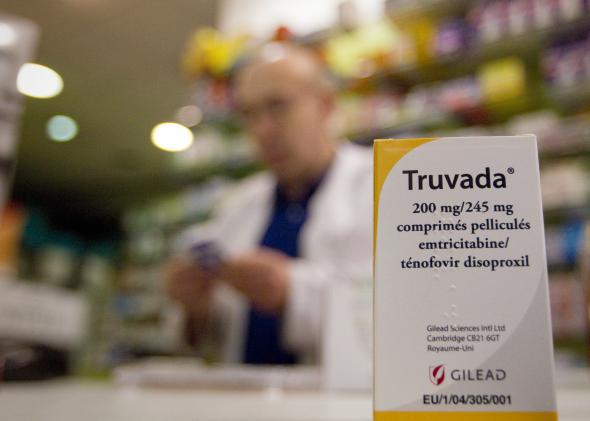Prominent HIV/AIDS activist Peter Staley had a smart, concise op-ed in the Advocate Wednesday about the future of pre-exposure prophylaxis (PrEP), the treatment approach that uses drugs like Truvada to prevent HIV from taking hold when an exposure occurs. In the piece, he challenges critics and those who are wringing their hands over the still-controversial practice (presumably myself among them) to expand our thinking about what PrEP might like look like in the future, as the science evolves. Today’s daily dose of Truvada—what most people mean when they reference PrEP now—could very soon be an occasional course of the drug (say, before a circuit party) or an injection every one-to-three months, akin to an allergy shot.
Staley expounds all this in order to push back on the idea that Truvada/PrEP might represent an unsettling lifelong commitment to taking powerful medicine every day in order to inhabit one’s gay sexuality “responsibly”—to be a so-called “good gay.” This notion was one of the motivating concerns behind my essay on the subject in December, and while I still think it’s a good one to consider in the present context, it’s also one that may indeed morph or fade as PrEP develops. But for Staley, the vision of lifelong pill-popping is, flatly, “a ridiculous assumption”:
How many gay men will have anal sex on a regular basis with no long-term monogamous relationships for the rest of their lives? I’m sure there are some lucky-in-bed, unlucky-in-love studs who accomplish that feat, but I have yet to meet any of these elderly sex machines.
PrEP, in Staley’s rendering, is something you pick up and use during periods of high and/or higher-risk sexual activity and then drop during fallow times or monogamous commitments. Clearly, this is one valid way to use the medical technology. But I do wonder how many people conceive of their sexual lives in such clear-eyed, pre-considered terms: Attraction has a way of surprising us, regardless of how we picture our situation, and, at least as it is currently administered, Truvada cannot just be snagged at the pharmacy on the way home from the bar. There is a kind of dissonance between the pitch that (for most people) PrEP is insurance for those random times when broader safer sex methods like condoms fail or fail to be employed, and Staley’s idea that it should function more like a limited-term, pre-planned diet. One wants lifelong insurance precisely because one cannot, generally speaking, foretell a season in which dental interventions will be more necessary or fender benders more likely.
That said, Staley’s argument that at least some people may use the current PrEP protocol this way is well-taken, as is his point that the technology will surely change in the coming years, possibly making parts of this discussion moot. But anxiety over the increasing medicalization of certain bodies and sexualities—a preoccupation of mine—will not be so easy to quiet.
Indeed, one of the more interesting genres of response I received to my December piece was from women who shared similar critiques about the birth control pill—which happens to be a commonly deployed analog for Truvada and one Staley touches on in his op-ed. I heard from a number of women who have always rejected the pill precisely because they do not understand why their bodies should be subject to intervention when more mutually demanding options like condoms are available. I relay this not to suggest that PrEP and the pill are the same, but merely to point out that there are legitimate reasons why this kind of anxiety persists and might persist even under something like Staley’s “PrEP 2.0,” especially among communities that have tended to find themselves subject to a heightened—and often prejudicial—scrutiny from the medical establishment.
Staley and his co-PrEPsters may find that frustrating, but until the headlines read “There Is a Daily Pill That Prevents HIV. Everyone Should Take It,” rather than just assigning that “should” to gay men, many people’s hands are going to keep on wringing.
